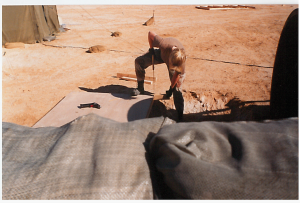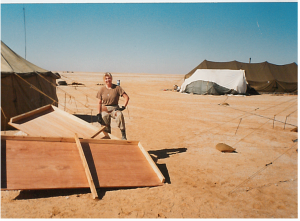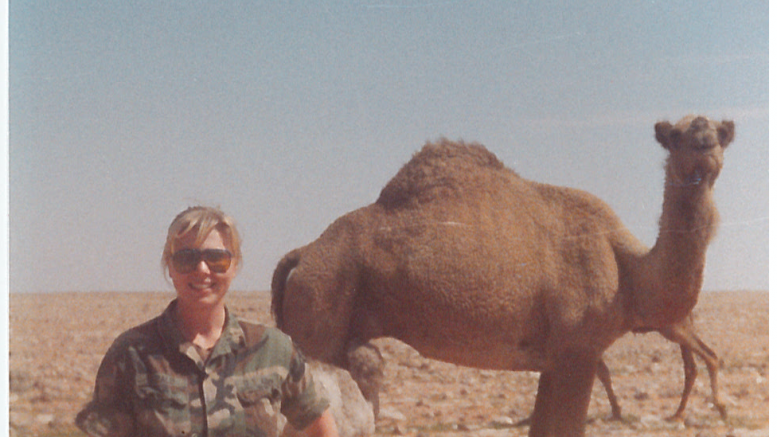An attorney by trade and veteran of Operations Desert Shield and Desert Storm, the South Carolina Council on Competitiveness’ President and CEO, Susie Shannon, boasts a series of professional titles and relative experiences needed for the job.
From her service in the U.S. Army Reserve and work in a large law firm, to In-House Chief Legal Counsel and Director of Research for a statewide public policy think-tank, Shannon’s skillset was forged through years of public service and a common trait shared with the grandfather who helped raise her.
Growing up in a small town in Horry County, Shannon said it was her grandfather’s commitment to service during the Second World War that spurred her own enlistment. In 1989, Shannon requested to serve as close to a combat unit as she was legally allowed and left for basic training just two weeks after Hurricane Hugo slammed into the Carolina coast.
“Combat positions were not available to women, and I was attached to the 413 Chemical Company in Florence, which is still there and going strong,” she said. “We were a chemical decontamination unit, and because Saddam Hussein used chemical munitions during the Iran and Iraq War, there was a legitimate concern he would use them again.”
Following her military service in Iraq, Shannon returned home and attended law school at the University of South Carolina. After earning her degree, the Horry County native clerked for a Charleston judge until joining McNair Law Firm in Columbia.
While working as an attorney in the state’s capitol, Shannon tacked on title as Director of Research for the Palmetto Institute where she remained until 2016. Briefly, Shannon served as the Senior Public Policy Counsel for BlueCross BlueShield of South Carolina.
It was during this time, Shannon said she was approached about an open position at the South Carolina Council on Competitiveness.
When hearing about the position, “I knew it was in my strike zone,” she said. “I wanted to find something that would offer the best use of my experiences.” 
By compacting her relative experiences over the last 25 years, Shannon said it has enabled her to take part in the state’s strategic leadership team.
Through specific education programs and partnerships with academic institutions, companies and state agencies with skin in the game, “we can meet the long-term competitive challenges for South Carolina,” she said. “We are taking lofty ideas and converting them into content for successful and innovative initiatives.”
- What was your impression of the South Carolina Council on Competitiveness before joining the team?
My involvement with the council goes all the way back to the beginning. The Council was formed in 2004 and grew out of the initial work of Palmetto Institute, a statewide public policy thinktank. The Council was born of business, community, and political leaders from around the state recognizing the need for a long-term strategy to compete globally. We carry out this mission today through actionable research, industry clusters, and education and workforce development initiatives.
It was not until I joined the Council that I became fully aware of the broad reach and intensive, day-to-day collaborative nature of its work. In addition to managing specific industry clusters such as SC Aerospace, iTs|SC (insurance technology services), and SC Logistics, we also focus on innovative education and workforce development initiatives.
For instance, one of our education programs, TransformSC, is a collaboration of business leaders, educators, students, parents, and policymakers working together to transform the public education system so that every student graduates prepared for careers, college, and citizenship.
All our cluster and program work is carried out in the true spirit of what it means to work in collaboration, and we cannot be successful in advancing our industry clusters and the state’s economy unless we fuse that work with improving our talent force. The Council on Competitiveness serves as the through-line and to which these varying clusters, initiatives, pilots, and programs attach.
- What was the council doing, or not doing, that will change with you on board?
When the Council was formed in 2004, no one fully recognized the concept of industry clusters and, moreover, it was debated whether South Carolina had any existing cluster activity at all. In fact, not only did we have clusters, they also served as the state’s primary economic drivers: Tire and automotive manufacturing, textile, tourism, agribusiness, and forestry, for example. But, it was clear that our economy was taking a turn and we had to get out ahead of it.
The conversation around economic development, as well as South Carolina’s economic landscape itself, has changed since 2004. My predecessors superbly elevated the visibility of the Council’s work and role within economic development across the state.
I would like to continue expanding our collaborative network with the regional economic development alliances, with our technical and community colleges, and with others to particularly focus on our logistics needs. Moreover, we need to raise continually public and industry awareness of the work we do.
The success of the annual SC Aerospace Conference & Expo, which just wrapped up another banner year; our re-doubled commitment to schoolhouse-to-workforce training; the need to increase our bank of research; and the lessons learned over the past 13 years remind us that we are doing well but that we also need to get ready to take some enormous leaps.
We often live and adapt within a 90-day world, but we should be thinking years ahead. Exponential technologies, machine learning capability, autonomous vehicles, advanced robotics, artificial intelligence: This was the stuff of imaginative, futuristic TV when I was growing up, but the avalanche of these technologies is no longer considered emergent. They are very real today, transforming the way we live, work, and play, and we need to constantly seek and connect with an ambitious vision of our future and prepare for it.
- How do your past experiences in the military and law serve you now?
Lessons learned from my prior military experience remain with me always. The importance of teamwork; of confidence and trust in your colleagues; and of clear communication of goals and strategic objectives: These are attributes I strive to apply every day on this job.
The most important lesson – and hardest to apply – is probably active listening and knowing when to keep quiet. It is not our purpose to dictate to our industry sectors what they need or have to do; instead, we should be listening to their needs and requirements and figure out a way to help get them where they want to go.
The one thing I did pick up in the Army that I cannot seem to shake, however, are the concepts of “dress-right-dress” and “squared-away;” I like to stay hyper-organized. That trait has come in handy while managing multiple clusters and programs.
Although I previously worked in a law firm environment and thoroughly enjoyed working side-by-side with my fellow attorneys, working “off the legal beaten path” has offered me an opportunity to compact in a breadth of meaningful and challenging experiences and to meet and work with many outstanding South Carolina business and policy leaders. My involvement in advancing policy initiatives and boosting transformational economic and community development projects gives me a chance to join in meaningful, catalytic work for the benefit of our State and local communities.
Now, I consider myself to be working for the benefit of a single client – the State of South Carolina. The Council is committed to advancing the long-term competitiveness of our state and its industries and citizens.
Finally, when working within the legal field, it is critical to know not only your client’s position, but also the position on every side of the issue and on all points around the table. You have to know what everyone is thinking.
- With the Upstate, Columbia and Charleston capturing most of the attention, how can you direct business to the state’s poorer sections like the Pee Dee Region and other parts of the Lowcountry?
Generation of economic activity within one region of the state should lead to positive activity across the state. While the Council is not actively involved in site selection or specific recruitment efforts, we do focus on identifying and nurturing industry sectors that are leading the state’s economic potential and success. It’s not about picking winners and losers; instead, it’s taking that team who is already on second base and helping them to home plate.
One distinct logistics industry game-changer within the Pee Dee will be the new inland port in Dillon. The economic activity associated with the port should lead to increased economic performance, and the proximity to the port is likely to result in additional investment in that region.
To boost success, the Pee Dee has a very effective concentration of education and workforce training institutions, such as Florence-Darlington Technical College and its SiMT facility, and we are already seeing spillover into the Pee Dee within the aerospace sector with a growing concentration of composite recycling and carbon fiber companies.
Likewise, the continued growth of the Charleston port is projected to have a positive economic impact on some of the counties near the water port as the logistics operations spread into neighboring counties.
- With the aerospace supply chain moving much different than automotive, what can South Carolina really expect to see in terms of a “Boeing Effect”? (Essentially, define state’s future role in aerospace)
Thanks to the work of our SC Aerospace cluster and our partners at SC Department of Commerce and the USC McNair Aerospace Center, South Carolina will continue to accelerate progress within the aerospace industry.
It is hard not to get excited about aerospace since there is so much “sizzle” and economic potential in this sector. Our opportunities are boundless with the growth possibilities of MROs (maintenance, repair, and operations), OEMs (original equipment manufacturers), remotely-piloted aircraft, and unmanned traffic management.
 We have existing companies that are already crisscrossing from aerospace to automotive to defense. We know how to do advanced manufacturing. We know how to go from proof to production. These are all areas in which South Carolina could assert leadership in its development and gain the competitive edge.
We have existing companies that are already crisscrossing from aerospace to automotive to defense. We know how to do advanced manufacturing. We know how to go from proof to production. These are all areas in which South Carolina could assert leadership in its development and gain the competitive edge.
As we continue to add to our aerospace strengths, we will need to ensure we build up the whole support system that goes along with it, including the talent pipeline. The Council and its aerospace collaborative are embarking on an aggressive aerospace education and workforce career campaign.
This fall, five high schools rolled out an aerospace engineering curriculum, and USC is offering classes in support of a bachelor in aerospace engineering degree. We are working now to develop and promote a digital and print career awareness campaign geared towards K-12 students, with a later rollout to our adult and transitioning workforce.
- South Carolina has been labeled a branch manufacturing state, what can be done to increase the state’s amount of headquartering facilities and research and development?
The discussion on how to recruit more HQs has been going on for years, with the same targets offered up: International airports, strengthened K-12, pro-business taxes, mass transit, for example. Although all those things are influential, personalized recruiting may win the day in convincing individual executive decision-makers that we want them here and that South Carolina is an attractive place to live, work, and do business.
It is important to note, on the other hand, that some companies are shrinking or deconstructing their headquarters and diffusing into satellite locales. Dedicated attention should be used to grow our own assets and nurture start-up enterprises. As our brand manufacturing assets grow and as technologies advance, we are primed to improve the state’s entrepreneurial environment.
As to R&D, in many cases, R&D and engineering operations follow manufacturing. The key will be to continue our focus on building a skilled workforce pipeline. STEM field education and support infrastructure for industry verticals are critical to ensure workers and companies have the tools they need to grow and prosper in South Carolina. The Council’s industry cluster work is focused on precisely providing that kind of support for industries.
- How will you define success in this position? Are there different levels, large and small?
I will embrace success, no matter the level or rate of accretion! Speaking as an organization, the Council’s success can be measured through direct participation in the state’s economy, whether through increased income levels, workforce participation, or educational attainment as examples.
We also look to the direct support we provide to our cluster companies: Are we helping them attract and retain talented workers? Are we helping them gain a larger market share? Are we helping them build their product faster, cheaper?


Be the first to comment on "Commitment to Service; Former attorney and U.S. Veteran settles into new role at state’s Council on Competitiveness"